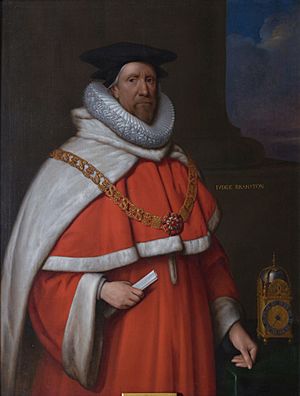John Bramston the Elder facts for kids
Sir John Bramston (born May 18, 1577 – died September 22, 1654) was an important English judge. He became the Chief Justice of the King's Bench, which was a very high position in the legal system of England.
Contents
Sir John Bramston: A Judge in Tough Times
Sir John Bramston was born in Maldon, Essex. He was the oldest son of Roger Bramston. He went to school in Maldon and then studied at Jesus College, Cambridge. After college, he joined the Middle Temple, a place where people trained to become lawyers. He worked very hard and quickly became known for his legal skills.
Early Life and Learning
John Bramston's university recognized his talent early. In 1607, they hired him as one of their legal advisors. He gave important lectures at his law school. In 1623, he became a "reader," teaching about old laws. This was a big honor, but it also cost a lot of money.
Soon after, he became a serjeant-at-law on September 22, 1623. This was another important step in his legal career. His son said this was a very expensive year for him.
Becoming a Top Judge
Sir John Bramston's legal work grew very busy. He handled many important cases. He worked in different courts, including the Chancery and the Star Chamber. In 1626, he defended the Earl of Bristol in a big case. However, Parliament was dissolved, and the case ended.
The next year, he helped people who were put in prison for not paying a special loan to the king. He tried to get them released. In 1628, the city of London chose him as one of their lawyers. He also defended members of Parliament who were accused of speaking against the king in 1629.
In 1632, he became the queen's chief lawyer. Two years later, he became the king's chief lawyer. He was also knighted, becoming "Sir" John Bramston.
The Ship Money Case
On April 14, 1635, Sir John Bramston reached the top of his career. He was made Chief Justice of the King's Bench. One of his first big actions was to advise King Charles I about "Ship money". This was a tax the king wanted to collect from everyone, even those not living near the coast.
At first, Sir John and other judges agreed that the king could collect this tax. However, his son later said that Sir John wanted to add a condition. He believed the tax should only be collected "during necessity." He only signed the full agreement because older judges said everyone should agree with the majority.
In 1638, the famous Ship money case went to court. A man named John Hampden refused to pay the tax. Sir John Bramston voted against the king in this case. He said the tax record was not clear enough. But he also made sure to say he agreed with the other judges on the main idea.
Later Years and Legacy
In 1640, Sir John Bramston led the House of Lords for a short time. Later, in 1640, Parliament started to question him and other judges. They were accused of supporting the king's right to collect Ship money. Sir John was told to stay near Parliament.
The king eventually removed him from his Chief Justice role in 1642. But the king still respected him. Parliament also wanted him to return as Chief Justice. They even suggested he serve "during good behavior," meaning he could not be easily removed.
Sir John Bramston was asked many times to work for Parliament. He was asked to be a judge again, even by Oliver Cromwell in his last year of life. But Sir John always said no, often because of his old age.
He passed away on September 22, 1654, at his home in Essex. He was 77 years old. People remembered him as a very wise and fair judge. He was known for listening patiently and giving his opinions with good reasons. Even other famous lawyers learned from him.
Family Life
Sir John Bramston married Bridget Moundeford in 1606. They had many children, and six of them lived longer than him. His son described Bridget as a kind and caring wife and mother. She was also very charitable. After she passed away, Sir John remained a widower for many years.
In 1631, he married Elizabeth Brabazon. She had been married twice before. His son was surprised by her appearance at first. But he later said she was a good wife and stepmother. She passed away in 1647.
 | James Van Der Zee |
 | Alma Thomas |
 | Ellis Wilson |
 | Margaret Taylor-Burroughs |


